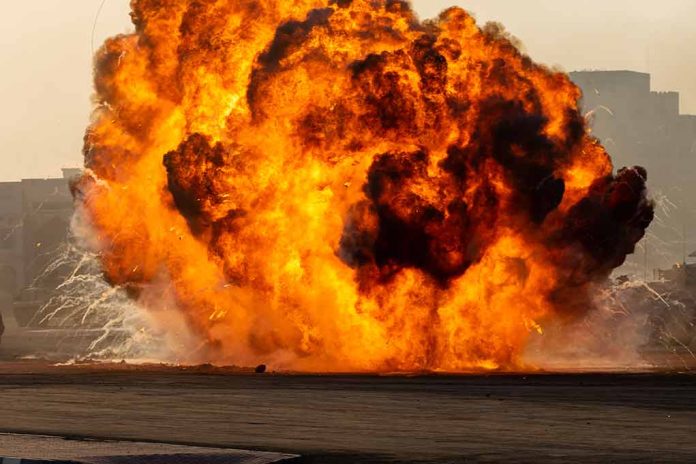
A devastating gasoline tanker explosion near Suleja, Nigeria, has claimed 86 lives and injured 55 others, spotlighting the dangerous consequences of fuel scarcity.
Key Takeaways
- A gasoline tanker explosion in Niger state, Nigeria, resulted in 86 deaths and 55 injuries.
- The blast occurred during an attempt to siphon fuel from a crashed tanker using a generator.
- Rising fuel costs following subsidy removal have driven people to engage in risky fuel collection methods.
- Similar incidents have caused over 265 deaths in Nigeria in the past five months.
- President Tinubu has called for a national awareness campaign on the dangers of collecting fuel from fallen tankers.
Tragic Explosion Highlights Nigeria’s Fuel Crisis
In a heartbreaking incident that underscores the dire consequences of Nigeria’s ongoing fuel crisis, a gasoline tanker explosion near Suleja in Niger state has claimed 86 lives and left 55 others injured. The catastrophe occurred when individuals attempted to siphon fuel from a crashed tanker carrying 60,000 liters of gasoline, using a generator that inadvertently ignited the volatile liquid.
The explosion took place at Dikko Junction, on a road linking the capital Abuja to Kaduna. Emergency responders faced grim challenges in the aftermath, with many victims burned beyond recognition. Ibrahim Audu Husseini, spokesman for Niger state’s emergency management agency, provided a sobering account of the tragedy’s toll.
“We buried 86 burnt corpses between 12:00 pm yesterday to 2:00 am of today,” said Ibrahim Audu Husseini, spokesman for the Niger state’s emergency management agency.
Economic Reforms and Unintended Consequences
The tragedy is deeply rooted in Nigeria’s recent economic reforms. President Bola Tinubu’s administration abolished fuel subsidies and ended currency controls, leading to significant economic challenges for the average Nigerian. These policy changes have resulted in skyrocketing fuel prices and rampant inflation, pushing desperate citizens to resort to dangerous methods of obtaining fuel.
The incident near Suleja is not isolated. Similar tragedies have claimed over 265 lives in the past five months alone, highlighting a disturbing trend. The practice of scooping fuel from fallen tankers has become increasingly common as Nigerians grapple with the harsh economic realities following subsidy removal.
The blast happened in the early hours of Saturday near the Suleja area of Niger state after individuals attempted to transfer gasoline from a crashed oil tanker into another truck using a generator. https://t.co/bURfy9c9Ym
— Stars and Stripes (@starsandstripes) January 19, 2025
Government Response and Road Safety Concerns
President Tinubu has expressed deep sorrow over the incident, calling for a national awareness campaign on the dangers of collecting fuel from fallen tankers. This response comes as the government faces mounting pressure to address both the economic hardships driving such risky behavior and the broader issue of road safety in Nigeria.
“Tinubu expressed ‘deep sorrow over the fuel tanker explosion,’ a statement from his office said Sunday, regretting ‘the tragic and preventable nature of the incident.'” – Tinubu
Poorly maintained roads contribute significantly to the frequency of tanker accidents in Nigeria. In 2020 alone, the country recorded 1,531 fuel tanker accidents, underscoring the urgent need for infrastructure improvements and stricter safety regulations in the transportation of hazardous materials.
International Response and Future Implications
The tragedy has drawn international attention, with countries like Türkiye extending condolences to Nigeria. As the nation mourns, questions arise about the long-term implications of current economic policies and their impact on public safety.
“We are deeply saddened by the loss of lives due to the fuel tanker explosion that occurred yesterday in the Gurara Local Government Area of Nigeria,” the country’s Foreign Ministry said in a statement.
As Nigeria grapples with this latest tragedy, the incident serves as a stark reminder of the complex challenges facing the country. Balancing economic reforms with public safety and providing affordable access to essential resources like fuel will be crucial in preventing future disasters and protecting the lives of Nigerian citizens.
Sources:
- Türkiye offers its condolences to Nigeria over fuel tanker truck blast
- At least 86 dead, 55 injured in Nigerian gasoline tanker explosion
- At least 86 dead, 55 injured in Nigerian gasoline tanker explosion – DNyuz



